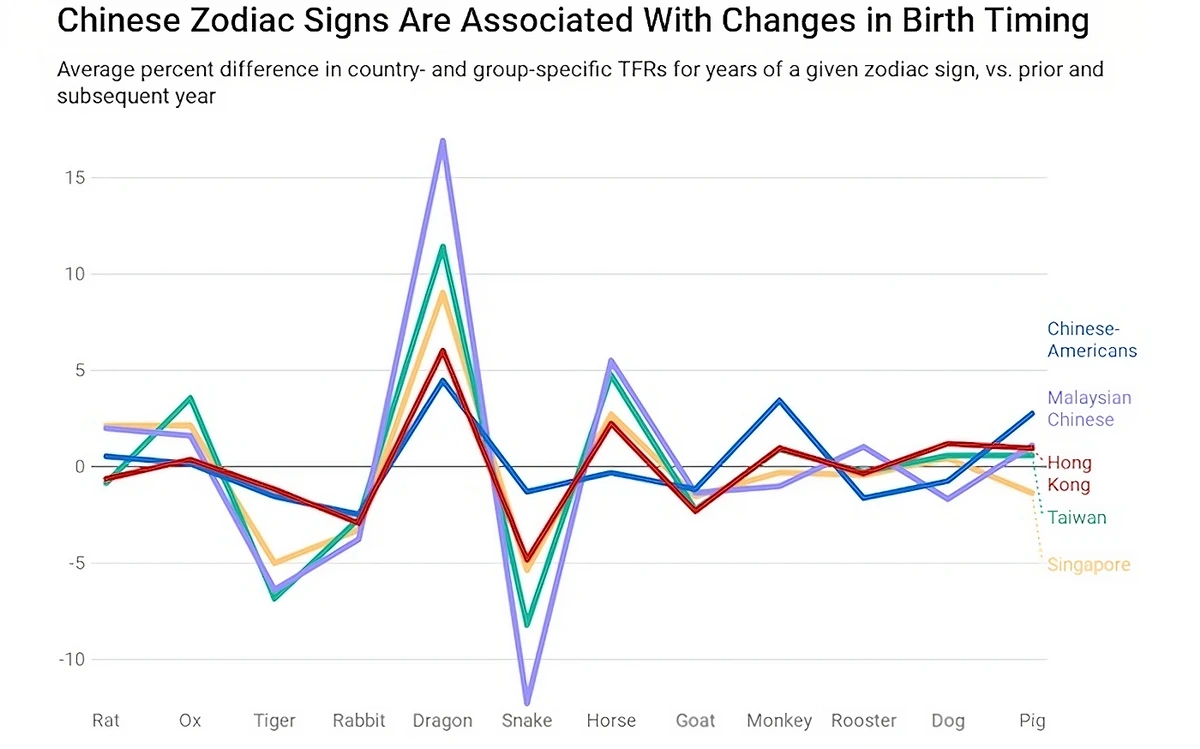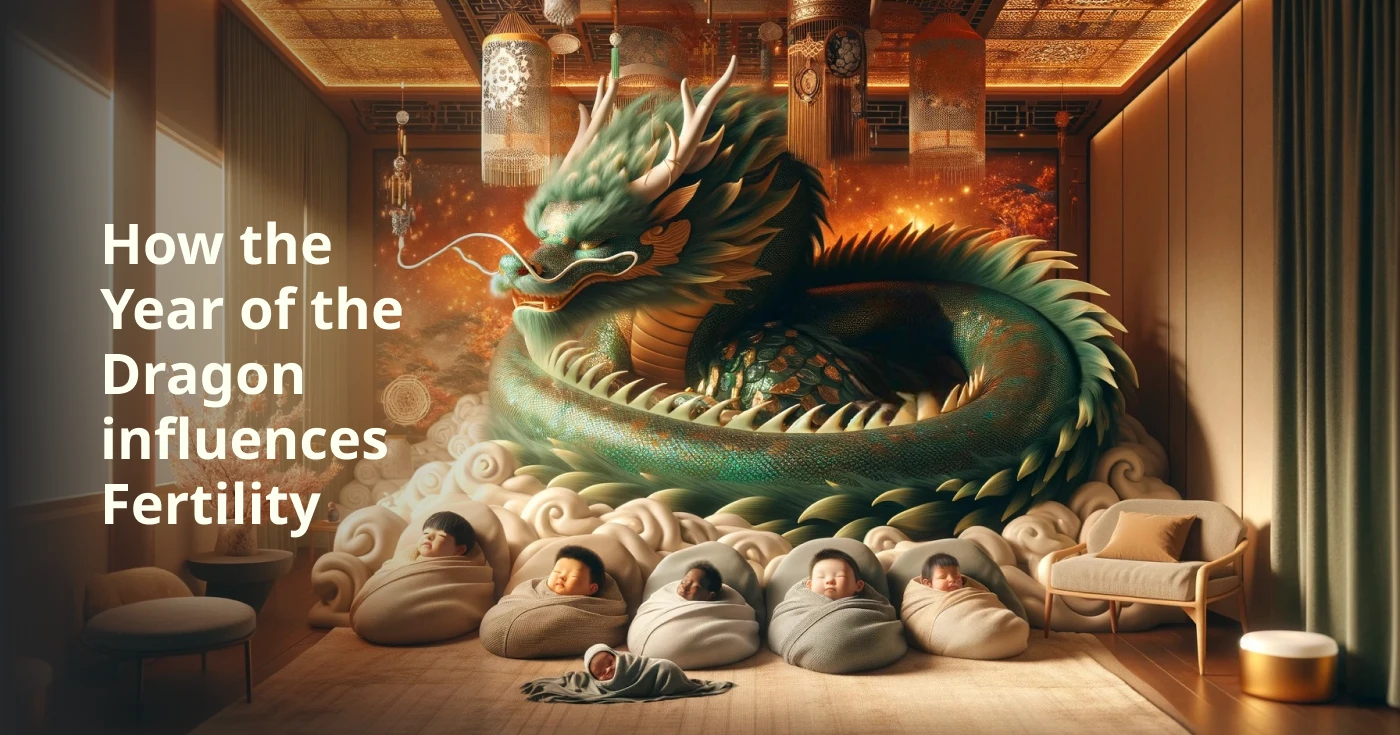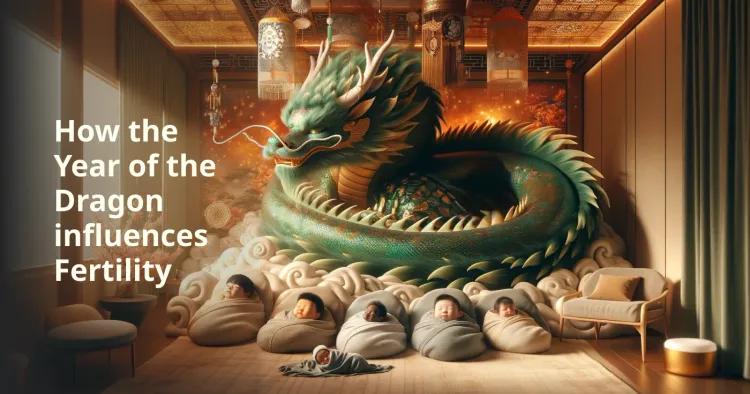China is losing its power — the workforce. A study by financier Ray Dalio shows that China's labor force has been shrinking at a record pace since 1961. It is shrinking by 5 million a year to date, and by 8 million a year from 2030. Alarm bells are ringing warning of a looming staffing drought that could leave the country short 200 million workers by 2050, equivalent to the entire U.S. labor force. Could this be the year that turns the tide? Yes, all thanks to the Year of the Dragon, writes the Washington Post in an article, “Could the Year of the Dragon bring the baby boom that Asia needs?”
Diving deep into the heart of Chinese astrology — a belief system that's been around for nearly 2,000 years — the dragon stands out. It's not just any zodiac animal; it's the crème de la crème, a mythical powerhouse believed to bestow success + good fortune on those born under its watch.
Within the Chinese zodiac's menagerie of 12 animals, each creature boasts its own set of strengths, weaknesses. Even the rat, hailed for its cleverness & agility, and the snake, with its dragon-esque appearance, are deemed fortuitous beings. Unlike its zodiac counterparts, some of which carry less favorable connotations, the dragon is in a league of its own. It's the embodiment of intelligence, confidence, ambition. This reputation is so strong that couples go to great lengths, from IVF treatments to strategically planned C-sections, to ensure their offspring arrive in the dragon's year. Schools even brace for a bump in enrollment, adding extra classes to accommodate the dragon-year baby boom.
ScienceDirect publishes statistics, how lucky & unlucky years on the Chinese Zodiac influence the timing of births.

Even state leaders are getting in on the action. Singapore's Prime Minister, Lee Hsien Loong, recently made headlines with his call to citizens, encouraging them to welcome a "little dragon" into their families. It's clear: when the dragon roars, Asia listens.
The belief in the power of the Year of the Dragon might have more than just folklore behind it. A 2019 study of Louisiana State University & Texas A&M University, diving into data from China, uncovered something intriguing: kids born in dragon years were not only acing university entrance exams at higher rates but also more likely to boast a college degree. Even more, the girls in this group were often taller. But it wasn't just the stars that made the magic happen. It boiled down to the dedication and resources that parents poured into these "dragon children."
Naci Mocan, an economics professor at Louisiana State University and co-author of the study, put it plainly, "It's the belief that dragon kids have something special that sparks this cycle [of baby boom]. When people have these kids, they invest in them – expect great things from them. This support, belief fuel the kids' success. That’s why this has been going on for centuries and generations."
In China, where the Lunar New Year is more than just a holiday — it's the heartbeat of the nation — there's a hopeful gaze towards this ancient belief to kickstart a baby boom. Hospitals are even stepping into the mix, offering couples schedules and advice on the perfect timing to conceive a dragon baby. One such advisory from the Huantai Maternity & Child Healthcare Hospital in Shandong province didn't mince words: "Now's the time! Use these months wisely to plan for your baby, backed by science."
Zhai Zhenwu, a guiding voice for the National Health & Family Planning Commission, shared with Times Finance this January a slice of optimism. The strong preference for astrological timing among the Chinese population signals a potential uptick in the fertility rate this year.

Illustration created by Pythia.Guru using DALL-E AI
This comes at a critical juncture for the world's second-largest economy, teetering on the brink of a demographic cliff. Despite easing up on family planning policies — now allowing couples up to three children — rolling out subsidies, other incentives, the allure of parenthood is fading for many in the younger generations.
If new births in 2023 mark a seventh consecutive year of decline, plunging to 9.02 million-sharply down from what was recorded in 2017-then China's robust population of 1.4 billion is on course to halve by 2100.
"The Year of the Dragon's lucky charm might give us a slight edge," says Huang Wenzheng, a demographics expert and senior fellow at the Center for China & Globalization in Beijing. "A bit of innovative thinking from the government to promote baby-making could nudge the fertility rate up by a tiny 0.01 percent," he suggests.
Both Huang & Naci Mocan, an economist, are betting on the dragon year to bring in an extra million new babies, bumping the total births for the year to around 10 million. It's not a shot in the dark; history shows us spikes in dragon years, with increases of nearly 300,000 in 2000 – a whopping 900,000 in 2012, according to Mocan's research.
A harbinger to this optimistic rush? Marriage is on the increase. Marriages were up by 4.5 percent through the first nine months of the year compared to the same time in the prior year; projections have weddings hitting 7 million by year's end, against 6.8 million in 2022.
In recent days, health experts have seen a spike in fertility inquiries, alluding to an enthusiastic public eager to bring new and propitious life into the world. Sherry Yang, who escorts Chinese females to fertility clinics in Kazakhstan, has received more requests than she had expected to, pandemic or not. Neither her rooms are filled to the capacity, yet the economic realities of her homeland were unimportant in this regard. One couple was expecting three dragon babies, – Yang assisted them in successful IVF treatment. In August, the triplets are expected to arrive.
Caesarean section may be used to ensure a vital moment. This inclination toward the birth clock prompted some medical experts to offer abortion concern the worst was doomed if the year outside China’s New Year doubt were out of the dragon year. “Several geographic birth year-related inquests notice scheduling C-sections for earlier delivery,” some physicians indicated.
Yang, still, argues that much of this heat is much of a return to pre-covid norms. “The future three years has proven hey-dismal with those attempting to birth. All the instructions and locks of health codes are the rules to foist the policy in China: a zero-COVID hat senses.”
Some people are born lucky. Yet, in China, leaving a child's destiny to the whims of fortune is a notion some parents prefer to sidestep.
Zhang Xiaolei's story reminds one of the role that zodiacal timing plays in family planning. Their first reunion as a betrothed couple, Zhang Xiaolei jokes, was to take out the Chinese zodiac calendar. "The decision was unanimous: we were to avoid a sheep year birth at all costs," explains Zhang Xiaolei, a 26-year-old civil servant from Shandong province. Her husband stopped drinking and took up a lot more athletics, while she did the same but tried to be healthier with her diet & sleep in hopes it would raise their conception chances. It wasn't enough. "After a year and half of trying we didn't make it through. Either the stress beat us," she says with an acidic voice.

The Dragon Year's Effect Isn't Confined to China
The astrological impact is not limited to mainland China-In Singapore and Malaysia, both predominantly ethnic Chinese nations, births tend to spike during the dragon year. Teresa Tan, a nanny specializing in postpartum care, is booked solid through September. Her bookings rose 40% compared with the same period last year. "The dragon year's influence is unmistakable," she says.
In Taipei, Taiwan, Cathy Tsai at Infancix, a postpartum-care center, reports a sea change in the behavior of clients. Expectant mothers book their spots as early as seven or eight weeks into pregnancy when normally they call up to 12 weeks in advance, she says. The dragon year's magic seems to be casting its spell wide, bringing hope and action across Asia.
Hong Kong's legendary fortuneteller Mak Ling-ling. Clients are sending in requests one after the other, all the calls come from "female celebrities but won't be named," all wanting a dragon year for her child. "The dragon baby competition is fierce," says Mak Lingling. "The zodiac may influence the Chinese birth rate greatly, but the current financial struggle poses serious challenge-reaching darkness."
In all honesty, the economy will not cope with this, – there will be a substantial shadow cast on birth rates. Extrapolating from how various predictions came to fruition, unless China’s hampered growth or significant shifts launch from its established policies, a real spike in childbirth forecasts is still a fantasy.
Poh Lin Tan, a senior research fellow at the Lee Kuan Yew School of Public Policy at the National University of Singapore, points out a critical nuance in this zodiac-driven baby boom phenomenon. "Studies, including those from Hong Kong, indicate that while zodiac considerations might influence the timing of births, they do little to address the underlying issue of declining fertility rates," she explains.
Huang, the Beijing-based demographer, critiques Chinese policy measures as too timid. "At the national level, there's a lack of substantial incentives, local governments' small financial subsidies hardly make a dent," he comments.
Yet, the allure of ancient beliefs persists. Han Yu, an economist at the University of Memphis who contributed to the 2019 study on dragon year children, is himself keen on having a child this lunar year. His personal connection to the dragon year — being a dragon child himself — adds a layer of nostalgia & pride. "Growing up, being a dragon felt special. I think it's pretty cool to have a dragon baby, especially when the dad's a dragon too," he shares, highlighting the enduring charm of these age-old traditions.
Why Millennials Are Putting Parenthood on Hold
Nowadays, it seems like the younger generation is taking their time when it comes to starting families. Take 28-year-old Sophia Wang from Beijing, who's all in for prioritizing her own goals first. Working in marketing at a consulting firm, she dreams of a DINK lifestyle — that's "double income, no kids" for the uninitiated. "I'm open to marriage, but having kids? That's a hard pass for me," Wang explains. "Our parents thought raising kids was a breeze — just feed them, watch them grow. But we see it differently."
The decline in fertility isn't just a problem in China. In the United States, demographers & journalists alike are digging deep into why fewer babies are being born, pointing fingers at familiar culprits like job security, childcare expenses, scarce parental leave, and soaring housing costs.

Culture Effects Matters on Fertility in the Long Run
The National Center for Health Statistics notes an interesting pattern: people tend to dodge holiday birthdays. It appears no one wants their social calendar or vacation plans disrupted by a Christmas Day delivery. This preference, mirrored by a dip in holiday births and a spike in C-sections around these dates, shows a clear intent to avoid holiday childbirth.
Globally, the impact of holidays & cultural observances on birth timings is undeniable, with documented shifts during Christmas, summer breaks in the Czech Republic, Ramadan in Israel, New Year's in France, the Ghost Month in Taiwan.
Indeed, American TV shows such as 16 and Pregnant & Teen Mom managed to push back the numbers of pregnancies among teens, the increased number of online searches regarding birth control, abortion did the rest. Without doubt, the mentioned examples often faced considerable criticism. But, as The Institute for Family Studies writes, “the latter development has coincided with a decline in young-age pregnancies that was so pronounced, – consistent that there is little doubt many of the empirical patterns would also stand up to replication over the corresponding time period.”

Still, the fall in young pregnancies was not mirrored by the increased numbers of newborns in older age groups. In reality, the numbers were even lower, as the same source above suggests. The power of showbiz on general trends of fertility is evidenced by numerous studies spanning virtually all countries in the world. In Brazil, the life of a birth of a child may be significantly affected by the percentage of children characters of soap operas have. Moreover, the naming can also change, as it was demonstrated in the 1990s. Higher watching rates in the end practically correlate with lower rates of eros likely to impact fertility. Of course, the list also includes the most technologized country, the US, where a high level of smartphone is deemed to lower sexual interest. Thus, the patterns take as from the individual, randomly distributed incidents to full-fledged societal myths affecting long-term fertility outcomes.
The transmission of societal values through generations could be an argument that cultural factors are embedded strongly and act over time. Indeed, as Bastien Chabe-Ferret demonstrates, it is a lot more than mere transmission. The norms are somewhat weakly followed, yet they never disappear. Indeed, one of the more curious results rested in reversing the model of the male-breadwinner, marriage. Despite the fact that higher adherence might lead to marriage into this model in a group, tips the wider adherence to the same model is seemingly plunging marriage rates. This particular study based on that notion even claims that feminism is the new natalism.
When Haber & his co-authors at Demographic Research state that the west has seen relationship norms shift towards egalitarian values, they also imply that more women are willing to have families. Still, their study discards any correlation between these changes and increased fertility rates on a global scale. This means that the American women’s yearning to have children is paired with a corresponding obstacle, which is not their willingness.
Lyman Stone, from the Institute for Family Studies & the American Enterprise Institute, emphasizes the fertility awareness gap between men + women, the fact that many of the latter do not suspect their chances of facing fertility challenges. In this case, a realistic understanding of their fertility information, the challenges of delayed childbearing, and the implications of their choices on family planning would be part of the sexual education the population requires.
Can I Use Astrology to Get Pregnant? How Does it Work?
Understanding that astrology is not a medical science, some people find it offers emotional support and a unique, holistic perspective on their fertility journey.
Still, how to plan your pregnancy using astrology:
- Understanding Your Astrological Chart
- Syncing with Lunar Cycles (The moon’s phases have long been associated with fertility & growth)
- Venus: The Beacon of Fertility. Venus, echoing the allure, nurturing essence of Aphrodite, plays a pivotal role in fertility, love, attraction. Its position in your chart, especially when gracing the 5th house, is auspicious for planning offspring.
- Jupiter: The Progenitor. Jupiter's lore is rich with tales of offspring, symbolizing abundance and prosperity. Its influence in your chart can indicate periods of heightened fertility & blessings.
- Chiron Transits: A Cosmic Nudge. The transits of Chiron, particularly to the Moon, Venus, Jupiter, the Ascendant, are seen as harbors of fertile potential, signaling opportune moments for conception.

What If the 5th House Is Empty?
An unoccupied 5th house doesn't spell a childless future. Instead, it suggests that children may not be the central theme of your life's narrative. Yet, as planets dance through this space, the seeds of parental desire might start to sprout, drawing your attention to the prospect of family life.
Can An Astrologer Help You Get Pregnant?
Yeah, he or she will tell you that at ages 28–40, the fifth house is most active. If you are interested in using the astrological method, there are fertility chart calculators that try to predict a baby's zodiac sign and potential gender.

